20 More Questions Every Woman Should Ask Herself
Spend some time with our second annual roundup of essential questions, and we promise you'll discover things about yourself—remarkable, rewarding things—that you never anticipated.
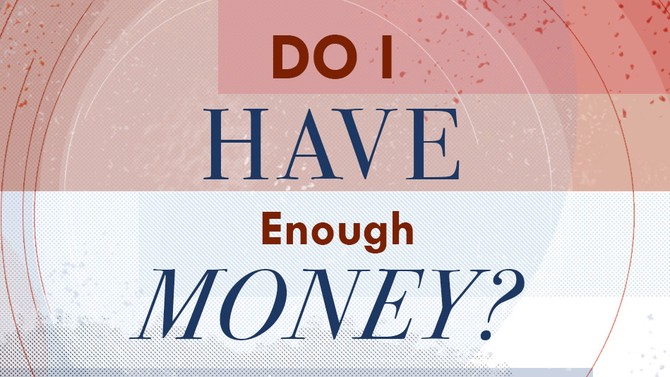
Illustration: OWN Digital
Do I Have Enough Money?
That word—enough—mystifies me. I have a knack for discontent: I declared four different majors in college, moved ten times in my 20s, always wish I'd ordered the same dish as the person next to me at a restaurant. I've spent decades chasing the right thing, the best fit, enough. I once spent six years growing my hair, and when it reached my waist I cut it to my chin.
I've never found the perfect middle ground with money. I had too little when I wanted to buy a car, so I settled for a motorized scooter. When my partner and I wanted to move in together, we found we couldn't afford it alone, so we moved in with another couple in the same situation, unwisely packing two homes into one. But I've also sometimes felt I had too much—when splurging on a $6 macchiato, or ordering a margarita on the beach in Baja next to a group of children begging for coins.
Is the realm of enough numerical, gauged by the figure in my bank account? Is it physical, measured by what I can touch, the things I own? Is it a state of mind, a spiritual plane I'm supposed to be reaching? I'm not sure.
But in the past few years I've decided that my enough is having a few dollars to invest in myself. I've started a sort of life education fund, for my "Self-Actualization List," which contains items ranging in cost from $30 to $10,000, all of which are designed to reacquaint me with my curiosity, to serve as a jumper cable for when life seems to stall: a mushroom foraging trek through the forest in Mendocino, California, a motorcycle-riding lesson, an overnight stay at a Buddhist temple, a trip to France's perfume capital to study the seductive power of scent, a geology class at the local college.
I can't afford everything on that list, but if I'm able to cross off one thing each month, I'm thankful. I may not secure a retirement pad in San Miguel de Allende with this "savings model," but I will have accumulated experiences and things that will make me better, happier, more whole—and that's enough for me.
—Jenna Scatena, Editor-at-Large of San Francisco magazine
I've never found the perfect middle ground with money. I had too little when I wanted to buy a car, so I settled for a motorized scooter. When my partner and I wanted to move in together, we found we couldn't afford it alone, so we moved in with another couple in the same situation, unwisely packing two homes into one. But I've also sometimes felt I had too much—when splurging on a $6 macchiato, or ordering a margarita on the beach in Baja next to a group of children begging for coins.
Is the realm of enough numerical, gauged by the figure in my bank account? Is it physical, measured by what I can touch, the things I own? Is it a state of mind, a spiritual plane I'm supposed to be reaching? I'm not sure.
But in the past few years I've decided that my enough is having a few dollars to invest in myself. I've started a sort of life education fund, for my "Self-Actualization List," which contains items ranging in cost from $30 to $10,000, all of which are designed to reacquaint me with my curiosity, to serve as a jumper cable for when life seems to stall: a mushroom foraging trek through the forest in Mendocino, California, a motorcycle-riding lesson, an overnight stay at a Buddhist temple, a trip to France's perfume capital to study the seductive power of scent, a geology class at the local college.
I can't afford everything on that list, but if I'm able to cross off one thing each month, I'm thankful. I may not secure a retirement pad in San Miguel de Allende with this "savings model," but I will have accumulated experiences and things that will make me better, happier, more whole—and that's enough for me.
—Jenna Scatena, Editor-at-Large of San Francisco magazine
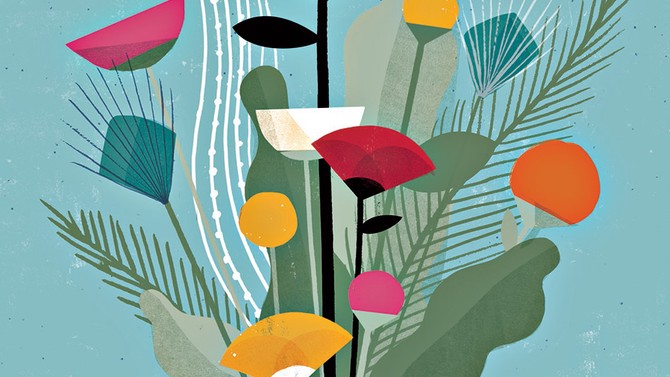
Illustration: Sari Cohen
Do I Feel at Home?
I once spent a very sad year living in an old railroad flat that had one window in front and one window in back and no sunlight in between. I gave each room a fresh coat of paint and bought a new bed and beautiful throw pillows. But these measures didn't do much to help. Finally, a friend said, "Don't spend any more money on this place. You can't put a price on natural light." But I could put a price on it! I realized that if I stretched my budget just a little bit, I could get a smaller but sunnier apartment with eight—count 'em, eight—windows. I moved and never looked back. That was how I realized that when it comes to a home that feels like home, light is an essential requirement. But it's not my only must-have. Warmth is important. For ten years, I was lucky enough to have a fireplace, and it was heaven. With a book, a cup of tea and a fire, there was never another place I wanted or needed to be.
Beauty is my third essential. I want a well-curated array of things both lovely to touch and useful to own: a Le Creuset teapot in winter white, handmade Japanese bowls for ramen, sheets that make me smile even if the thread count isn't high. I've optimistically monogrammed our towels with the word casa, Spanish for "house," because one day I hope to also have a beach house, whose towels will be monogrammed, naturally, playa.
Though I no longer live alone—I'm married, and we have a child—our apartment isn't big. Early on, my husband and I agreed that we wanted to always have the smallest home that made sense so we could be able to take the big vacations we love. Despite our limited space, there are reading nooks in each bedroom, and in the living room, a charcoal sectional fits three if we want to be close or two if we want a little space. In our home, there is always a place to snuggle, to sit alone, to cry the day out.
Our home is rarely perfectly clean, but it's perfectly arranged to soothe and inspire. I think almost any amount of mess can be tolerated when one has a cheerful attitude about one's home and the people who share it. When I walk in the door I want that ahh feeling, and I want my family to feel it, too. My friends laugh, but most nights I mix my husband a martini and put it in the freezer, and make my daughter a cup of warm pink milk. "Welcome home!" I say. Because no matter what happens out there, all is well within these walls. No, it's better than well—it's downright swell in here.
—Veronica Chambers, author of, most recently, Kickboxing Geishas
Beauty is my third essential. I want a well-curated array of things both lovely to touch and useful to own: a Le Creuset teapot in winter white, handmade Japanese bowls for ramen, sheets that make me smile even if the thread count isn't high. I've optimistically monogrammed our towels with the word casa, Spanish for "house," because one day I hope to also have a beach house, whose towels will be monogrammed, naturally, playa.
Though I no longer live alone—I'm married, and we have a child—our apartment isn't big. Early on, my husband and I agreed that we wanted to always have the smallest home that made sense so we could be able to take the big vacations we love. Despite our limited space, there are reading nooks in each bedroom, and in the living room, a charcoal sectional fits three if we want to be close or two if we want a little space. In our home, there is always a place to snuggle, to sit alone, to cry the day out.
Our home is rarely perfectly clean, but it's perfectly arranged to soothe and inspire. I think almost any amount of mess can be tolerated when one has a cheerful attitude about one's home and the people who share it. When I walk in the door I want that ahh feeling, and I want my family to feel it, too. My friends laugh, but most nights I mix my husband a martini and put it in the freezer, and make my daughter a cup of warm pink milk. "Welcome home!" I say. Because no matter what happens out there, all is well within these walls. No, it's better than well—it's downright swell in here.
—Veronica Chambers, author of, most recently, Kickboxing Geishas
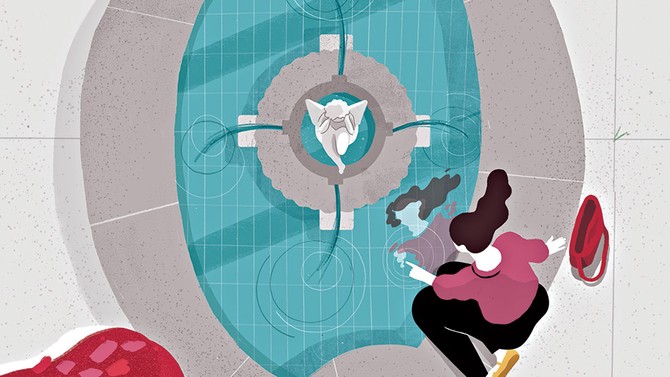
Illustration: Sari Cohen
What Should I Try Today?
Adventurous suggestions from five folks in the know.
If you haven't had breakfast... Do! To keep it interesting, try the morning meals of other nations, says Lucy Walker. "I could live on Jamaican ackee with callaloo, which are a fruit and a green, respectively; Thai som tam, an unripe papaya salad; Myanmar's mohinga, a fish and noodle soup; and Japanese natto, or fermented soybeans—it resembles alien frog spawn, but I love it." (Of course, you can stick to eggs and bacon—but where's the fun in that?)
If you're heading out soon... Don't forget to accessorize. Dorothea Lasky has a suggestion: bangles, the janglier the better. "The poet Anne Sexton used to wear them—maybe a poet should make sounds even when she's not speaking. I wear as many as I can. And don't let gender stop you: Everyone looks good in them."
If you have a little time this evening... Indulge in a glass of wine. "Olivier Cousin's Le Grolle is one of the most unique reds I've tasted," says Sharon Van Etten. "He's a French farmer who plows his fields with a horse—a guy who doesn't play by the rules—and it shows in his wine."
If you have a little time before this evening... Enjoy two songs: "Night Owl" by Tiny Ruins ("they're a folky jazz group with such descriptive lyrics," says Van Etten) and the Beatles' "Golden Slumbers" ("I love Abbey Road," says Walker, but this overlooked track is "the one that makes me cry every time").
If you have an hour or so to listen to something... Put on a bluesy Lucinda Williams record, says Hannah Pittard ("Her music is like this pulsing vein") and Lasky ("I love her! I named my dog after her"). Or try out Iamamiwhoami's Kin, says Brittany Howard. "It's a badass electronic album that's elegant and thoughtful."
If you have an hour or so to read... An hour is plenty long enough to enjoy a few gorgeous poems. Start with Bernadette Mayer's, says Lasky: "She's a good gateway poet. She shows you all the things a poem can be about: baseball, corn on the cob—anything!"
If you have a few hours for a good book, try... "Susan Cain's book Quiet (2012) explores how we connect success with being outgoing," says Van Etten. "Reading it showed me that even an introvert like me can thrive." If you'd prefer fiction, don't miss Lorrie Moore's Anagrams (1986), says Pittard. "It's a masterpiece about the difficulties and dangers of being a woman. It leaves me clutching my chest for air."
Rather watch a movie instead? Try... "Metropolitan (1990) is a love story about rich, bored New York City teens during debutante season. But I promise it's funny and beautiful," says Pittard. Or if you're in a dramatic mood, consider Boyhood (2014). "[It] was filmed over 12 years, so you watch the actors grow up," says Van Etten. "Even at nearly three hours long, there's never a dull moment."
The Experts:
Lucy Walker, documentary filmmaker (The Lion's Mouth Opens, The Crash Reel)
Hannah Pittard, novelist (Reunion)
Brittany Howard, singer, Alabama Shakes (Boys & Girls)
Dorothea Lasky, poet (Rome)
Sharon Van Etten, singer-songwriter (Are We There)
If you haven't had breakfast... Do! To keep it interesting, try the morning meals of other nations, says Lucy Walker. "I could live on Jamaican ackee with callaloo, which are a fruit and a green, respectively; Thai som tam, an unripe papaya salad; Myanmar's mohinga, a fish and noodle soup; and Japanese natto, or fermented soybeans—it resembles alien frog spawn, but I love it." (Of course, you can stick to eggs and bacon—but where's the fun in that?)
If you're heading out soon... Don't forget to accessorize. Dorothea Lasky has a suggestion: bangles, the janglier the better. "The poet Anne Sexton used to wear them—maybe a poet should make sounds even when she's not speaking. I wear as many as I can. And don't let gender stop you: Everyone looks good in them."
If you have a little time this evening... Indulge in a glass of wine. "Olivier Cousin's Le Grolle is one of the most unique reds I've tasted," says Sharon Van Etten. "He's a French farmer who plows his fields with a horse—a guy who doesn't play by the rules—and it shows in his wine."
If you have a little time before this evening... Enjoy two songs: "Night Owl" by Tiny Ruins ("they're a folky jazz group with such descriptive lyrics," says Van Etten) and the Beatles' "Golden Slumbers" ("I love Abbey Road," says Walker, but this overlooked track is "the one that makes me cry every time").
If you have an hour or so to listen to something... Put on a bluesy Lucinda Williams record, says Hannah Pittard ("Her music is like this pulsing vein") and Lasky ("I love her! I named my dog after her"). Or try out Iamamiwhoami's Kin, says Brittany Howard. "It's a badass electronic album that's elegant and thoughtful."
If you have an hour or so to read... An hour is plenty long enough to enjoy a few gorgeous poems. Start with Bernadette Mayer's, says Lasky: "She's a good gateway poet. She shows you all the things a poem can be about: baseball, corn on the cob—anything!"
If you have a few hours for a good book, try... "Susan Cain's book Quiet (2012) explores how we connect success with being outgoing," says Van Etten. "Reading it showed me that even an introvert like me can thrive." If you'd prefer fiction, don't miss Lorrie Moore's Anagrams (1986), says Pittard. "It's a masterpiece about the difficulties and dangers of being a woman. It leaves me clutching my chest for air."
Rather watch a movie instead? Try... "Metropolitan (1990) is a love story about rich, bored New York City teens during debutante season. But I promise it's funny and beautiful," says Pittard. Or if you're in a dramatic mood, consider Boyhood (2014). "[It] was filmed over 12 years, so you watch the actors grow up," says Van Etten. "Even at nearly three hours long, there's never a dull moment."
The Experts:
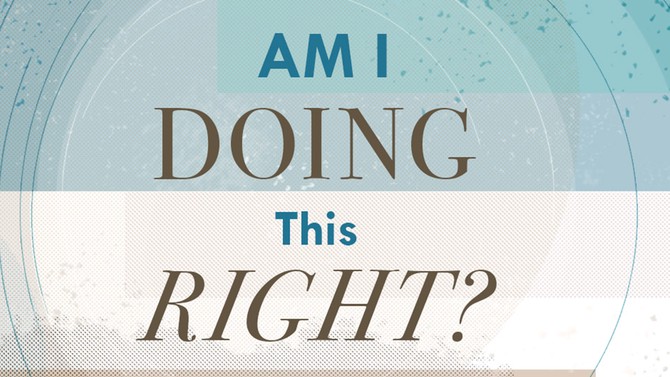
Illustration: OWN Digital
Am I Doing This Right?
No, you do not have to wash your hair every day; only when it's dirty. But yes, you must wash your face every night—though it's fine just to rinse in the morning. Yes, you should always send a card or an email or call after a dinner party. No, you don't have to apologize for disagreeing. No, you don't have to have curtains—or table settings for eight (or even four). No, you don't need a signature fragrance. Yes, there is lead in your lipstick—but not enough to harm you, unless you're eating 15 tubes a day. What's the healthiest thing to have first thing in the morning? A stretch and some fruit. (And also gratitude. And right before bed? More gratitude.) No, you don't need to brush your hair, except to style it. Yes, you do want to think twice about anything you post on social media. No, you don't have to answer the phone whenever it rings. Yes, it's fine not to know what comes next; you'll figure it out. It's also fine to wear your hair at any length you please, no matter your age. Yes, you should probably get a skin cancer check once a year. And yes, you must know where your money is—and double-check that you know for sure. No, you don't want to compare, because comparing is the death of happiness. But yes, you might want to compete, because in the right context (a Flywheel class, say) competition can be very motivating. Yes, you can be dear friends with your exes. Yes, you do have to forgive your parents, but first you have to forgive yourself. And: Yes you can, yes you will, yes.
—Valerie Monroe, O's Beauty Director
—Valerie Monroe, O's Beauty Director
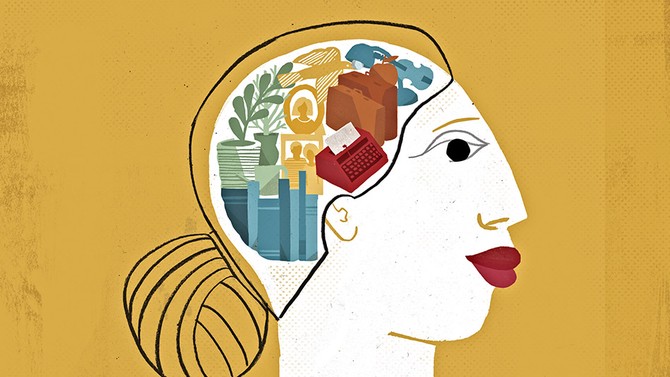
Illustration: Sari Cohen
Am I Smart?
I've met famous scholars who were in many ways profoundly stupid, and a lot of Special Olympians who are deeply intelligent. It boils down to this: You have within yourself a deep central point I call your sense of truth. It knows the difference between clever nonsense and simple profundity, and resonates with all that feels real and right. Lose your sense of truth, and you'll be stupid no matter how smart you are. But tune into that sense, and your intelligence will be infinite.
—Martha Beck
—Martha Beck

Illustration: OWN Digital
Am I Funny?
Okay, let me ask a few more questions here.
Are you currently accessorized in any of the following: a lamp shade, clown shoes, plastic Groucho glasses attached to a phony nose and mustache?
Do you have a tendency to squirt people with a seltzer bottle, slip on banana peels, blow your nose into an 11-foot multicolored silk handkerchief?
Have you ever started a story with the words,"An aardvark and a tuba player walk into a bar..."?
Frankly, funny will always be in the eye and/or ear of the beholder. But for my money, a subversive wit, a deep appreciation of quirk and an unwavering willingness to say what we're all thinking beat anybody modeling a lampshade. In fact, I'd say if you answered no to any of the questions above, chances are you're on the right track.
—Lisa Kogan, O's Writer at Large
Are you currently accessorized in any of the following: a lamp shade, clown shoes, plastic Groucho glasses attached to a phony nose and mustache?
Do you have a tendency to squirt people with a seltzer bottle, slip on banana peels, blow your nose into an 11-foot multicolored silk handkerchief?
Have you ever started a story with the words,"An aardvark and a tuba player walk into a bar..."?
Frankly, funny will always be in the eye and/or ear of the beholder. But for my money, a subversive wit, a deep appreciation of quirk and an unwavering willingness to say what we're all thinking beat anybody modeling a lampshade. In fact, I'd say if you answered no to any of the questions above, chances are you're on the right track.
—Lisa Kogan, O's Writer at Large
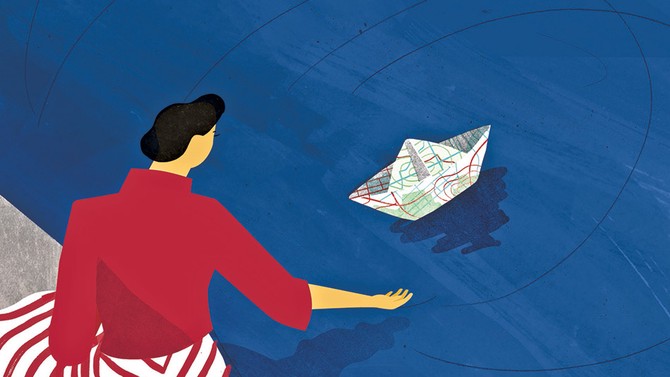
Illustration: Sari Cohen
Do I Have Enough Fun?
Fun is necessary. It delivers oxygen to the soul. And yet it's paradoxical. You must have it, but straining to do so misses the point. Planning is the death of fun.
Which doesn't stop us from trying to arrange it, to coax it into being. (Our approach to weddings is a good example. We turn what could be a joyous party into a yearlong gauntlet of debt, drama and anxiety.) Because fun cannot, in my opinion, be created, what we end up arranging is not fun but distraction. Watching TV, gossiping with the work gaggle during happy hour and shopping are satisfying activities, but they're not fun.
When I was a kid, I loved to ride roller coasters—Disneyland's Matterhorn, Coney Island's rickety Cyclone. The slow ascent, the shivery pause at the top, the exhilarating drop: fun!
How do we recapture that? By living in the moment—by being ready. Fun isn't an activity; it's the result of our willingness to be open. Fun is about spontaneity. It finds us when it wants to, and our job is to be ready.
On my most recent birthday, my family and a handful of overnight guests gathered around my table. We listened to music, drank wine, ate Oreo ice cream cake ablaze with kiddie candles. My teenage daughter and I decided to swing dance. I sent her out to spin and reeled her back in like a yo-yo. She had been so grouchy all evening. She was annoyed whenever she had to look up from her phone—she was annoyed about basically everything. But even she managed to make the choice we all must make, which is to embrace fun. And when she did, we achieved lift-off, right there in the kitchen.
We must make room for joy whenever it decides to show its mischievous face. And we must do this consistently, indefinitely. Or to quote that master of fun, Dr. Seuss: "Today is gone. Today was fun. Tomorrow is another one."
—Thelma Adams, author of the novel Playdate
Which doesn't stop us from trying to arrange it, to coax it into being. (Our approach to weddings is a good example. We turn what could be a joyous party into a yearlong gauntlet of debt, drama and anxiety.) Because fun cannot, in my opinion, be created, what we end up arranging is not fun but distraction. Watching TV, gossiping with the work gaggle during happy hour and shopping are satisfying activities, but they're not fun.
When I was a kid, I loved to ride roller coasters—Disneyland's Matterhorn, Coney Island's rickety Cyclone. The slow ascent, the shivery pause at the top, the exhilarating drop: fun!
How do we recapture that? By living in the moment—by being ready. Fun isn't an activity; it's the result of our willingness to be open. Fun is about spontaneity. It finds us when it wants to, and our job is to be ready.
On my most recent birthday, my family and a handful of overnight guests gathered around my table. We listened to music, drank wine, ate Oreo ice cream cake ablaze with kiddie candles. My teenage daughter and I decided to swing dance. I sent her out to spin and reeled her back in like a yo-yo. She had been so grouchy all evening. She was annoyed whenever she had to look up from her phone—she was annoyed about basically everything. But even she managed to make the choice we all must make, which is to embrace fun. And when she did, we achieved lift-off, right there in the kitchen.
We must make room for joy whenever it decides to show its mischievous face. And we must do this consistently, indefinitely. Or to quote that master of fun, Dr. Seuss: "Today is gone. Today was fun. Tomorrow is another one."
—Thelma Adams, author of the novel Playdate
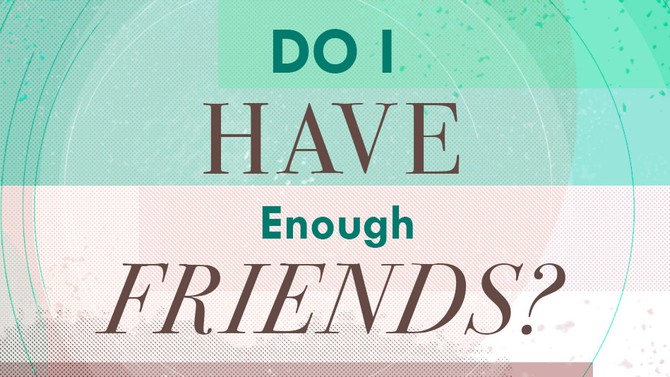
Illustration: OWN Digital
Do I Have Enough Friends?
We've known since childhood that you're not supposed to use people, but I happily admit that I use my friends all the time. I've even cultivated friendships to serve specific needs. When the rigors of parenting are getting me down, I call an emergency lunch with my mordant friend Michele, who always knows where to find the funny. After a particularly punishing day at the office, it's a vat of Chardonnay with Deborah, while Anne absorbs the details of my ancient father's decline like no other—she's known my family since we were in kindergarten, after all. Schadenfreude-immune Alison is my go-to with bad news, Lisa takes unalloyed pleasure in the good and soul sister Beth just embraces it all. The liberal supply of lobster rolls and intricate conversation at her place up in Massachusetts is my idea of a spa weekend.
While some people entrust their deep, dark stuff to a superspecial bestie, I spread the burden over many. Partly because it would be unfair, I think, to saddle one person with the time-consuming—and oh so enjoyable!—task of providing me with a constant sense of well-being (just ask my husband, who's very happy for the help). But also because different issues and moods require the ministrations of different friends. It's a little like selecting the right vacuum cleaner attachment for the job, and I mean that more lovingly and admiringly than it sounds. Sometimes all your psyche requires is a pleasurable buffing with a soft duster; other times it calls for a probing instrument to get at the really hard-to-reach schmutz. How many friends are enough? As many as it takes to give you a sense of being known.
When I'm feeling needy, I try to be mindful of who can handle what. Tom tolerates a level of whining that I can't imagine visiting upon any other friend; in exchange, I spare Tom, who doesn't have kids, the more gritty and granular tales of child-rearing (I have a veritable SWAT team of mom friends for that). Mark and Jim provide ample space, psychological and otherwise, for my id to roam free during our epically decadent weekends together. And I can hardly believe the embarrassing tidbits I'll bestow on Dana, but why not? When you're sorting underpants together in the laundry room of the summer house you share, things quickly get intimate.
I hasten to point out that these friendships are a two-way street; all of the above know I'm open for business day or night, whenever they may need me. And I don't take offense if on some occasions I'm not their first call—not the perfect tool for the job at hand—although I'd like to be. Because when it comes to friends, I just want to be loved. And used.
—Lucy Kaylin O's Editor In Chief
While some people entrust their deep, dark stuff to a superspecial bestie, I spread the burden over many. Partly because it would be unfair, I think, to saddle one person with the time-consuming—and oh so enjoyable!—task of providing me with a constant sense of well-being (just ask my husband, who's very happy for the help). But also because different issues and moods require the ministrations of different friends. It's a little like selecting the right vacuum cleaner attachment for the job, and I mean that more lovingly and admiringly than it sounds. Sometimes all your psyche requires is a pleasurable buffing with a soft duster; other times it calls for a probing instrument to get at the really hard-to-reach schmutz. How many friends are enough? As many as it takes to give you a sense of being known.
When I'm feeling needy, I try to be mindful of who can handle what. Tom tolerates a level of whining that I can't imagine visiting upon any other friend; in exchange, I spare Tom, who doesn't have kids, the more gritty and granular tales of child-rearing (I have a veritable SWAT team of mom friends for that). Mark and Jim provide ample space, psychological and otherwise, for my id to roam free during our epically decadent weekends together. And I can hardly believe the embarrassing tidbits I'll bestow on Dana, but why not? When you're sorting underpants together in the laundry room of the summer house you share, things quickly get intimate.
I hasten to point out that these friendships are a two-way street; all of the above know I'm open for business day or night, whenever they may need me. And I don't take offense if on some occasions I'm not their first call—not the perfect tool for the job at hand—although I'd like to be. Because when it comes to friends, I just want to be loved. And used.
—Lucy Kaylin O's Editor In Chief
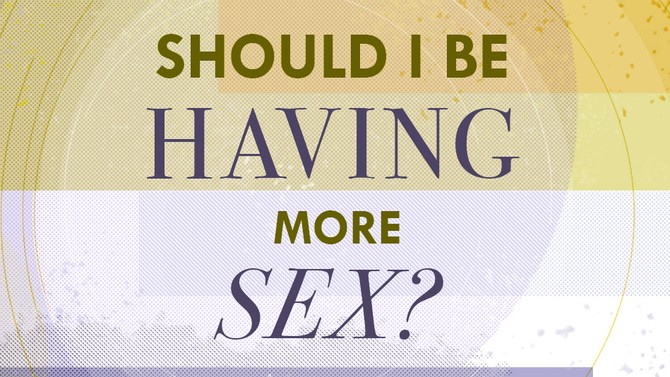
Illustration: OWN Digital
Should I Be Having More Sex?
The answer is different for everyone, of course, and it all depends on your circumstances and appetite and even your definition of sex—but assuming you have regular access to sex, assuming you have a partner who's up for it whenever you are (or maybe, as per the cliché, said partner is up for it far more often than you are), we'd like to offer a few thoughts. One of us advises a policy of hair-trigger impulse indulgence: Whenever you feel even the slightest twinge of desire, act on it. Because if you ignore those stirrings often enough, you'll learn never to act on them—and that's the end of that. Another of our number says she can always tell she and her husband have put off sex too long when they start snipping at each other; that sex is a reliable glue, a fun way to remember that the two of them do, in fact, like each other, despite all the laundry and fatigue and permission slips to sign. One of us says she always feels like she has enough because she has a great vibrator, while another is never having enough, apparently, because her partner wants less than she. (Don't worry—she also has a good vibrator.) Finally, a colleague suggests that you consider this question the way you might consider whether you're drinking enough water: Do you feel thirsty all the time? Do you believe your life would be richer with more water in it? Are you happy drinking water alone if you can't share it with a friend? Whatever your answer to this essential question, the point is that it is essential. Sex is something your body wants, needs and deserves. Plus it's hot, and part of being human, and enjoyable. That's the part that's easiest to forget, actually—that the very crux of sex is pleasure. Yes, it is essential, but if it feels like a chore, don't do it. If it feels like obligation, don't do it. However, if you want some free delight, a cheek-rosying diversion, just because, then for God's sake, DO IT.
—The editors of O
—The editors of O
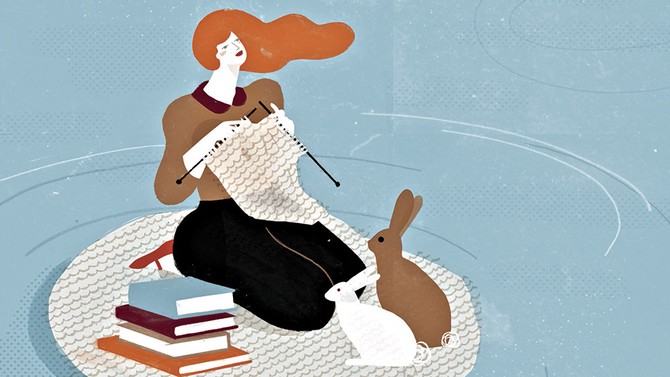
Illustration: Sari Cohen
Do I Enjoy My Own Company?
In my early 30s, I moved from a small bungalow in the Bay Area to a hippie barn in Santa Fe to take a new job. The barn, with its tin doors and weathered wood, had seemed novel, a radical change. Here my boyfriend and I would explore our mellow sides, walking the dog on dusty horse trails, eating dinner at our picnic table. It sounded romantic.
But soon after we'd unpacked, he left for a month-long writing fellowship in another state. I found myself in this new, rural place alone. And I panicked. Though I'd grown up an only child, I no longer knew how to sit with myself for long stretches of time. And honestly, my childhood had been lonely. My parents both had busy, demanding careers and a penchant for budget babysitters—many of whom did little more than watch television and talk on the phone. I spent great swaths of time inventing games by myself in my room. As soon as I was old enough to drive, I hung out constantly with friends, a habit that persisted throughout my 20s. I wasn't all that interested in reclaiming solitude. In the first week alone in the barn, I called every person in my phone, even people I barely knew. But after I'd talked to everyone, after my eyes nearly fell out of my head from watching TV, I realized I couldn't keep this up for four weeks.
So I did something I'd always wanted to do: I signed up for banjo lessons.
At night I practiced, looking out at the sunsets over the chamisa flowers, the jackrabbits loping by. When I got tired of the chord progressions, I'd knit or read. And though I expected to be dogged by loneliness—that mortal childhood enemy—I felt, instead, a surprising calm. All this time, I'd been working so hard to avoid myself, but as it turned out, I liked being alone. Me and myself had so many shared interests, so much to say to each other! If I permitted it, I was good company. That felt like such a revelation.
The longest relationship we have with anyone is with ourselves, and yet that relationship is often the first one we let slide. Maintaining it brings such comfort, though: Liking your company means that you always have at your beck and call a person who gets you.
So if everyone departs and you're left feeling lonely and adrift—or if you never allow yourself to be alone—ask yourself what you'd do if you had a friend over. You'd be curious about her, you'd engage with her, you'd be compassionate. Why not treat yourself the same way?
—Robin Romm, author of, most recently, the memoir The Mercy Papers
But soon after we'd unpacked, he left for a month-long writing fellowship in another state. I found myself in this new, rural place alone. And I panicked. Though I'd grown up an only child, I no longer knew how to sit with myself for long stretches of time. And honestly, my childhood had been lonely. My parents both had busy, demanding careers and a penchant for budget babysitters—many of whom did little more than watch television and talk on the phone. I spent great swaths of time inventing games by myself in my room. As soon as I was old enough to drive, I hung out constantly with friends, a habit that persisted throughout my 20s. I wasn't all that interested in reclaiming solitude. In the first week alone in the barn, I called every person in my phone, even people I barely knew. But after I'd talked to everyone, after my eyes nearly fell out of my head from watching TV, I realized I couldn't keep this up for four weeks.
So I did something I'd always wanted to do: I signed up for banjo lessons.
At night I practiced, looking out at the sunsets over the chamisa flowers, the jackrabbits loping by. When I got tired of the chord progressions, I'd knit or read. And though I expected to be dogged by loneliness—that mortal childhood enemy—I felt, instead, a surprising calm. All this time, I'd been working so hard to avoid myself, but as it turned out, I liked being alone. Me and myself had so many shared interests, so much to say to each other! If I permitted it, I was good company. That felt like such a revelation.
The longest relationship we have with anyone is with ourselves, and yet that relationship is often the first one we let slide. Maintaining it brings such comfort, though: Liking your company means that you always have at your beck and call a person who gets you.
So if everyone departs and you're left feeling lonely and adrift—or if you never allow yourself to be alone—ask yourself what you'd do if you had a friend over. You'd be curious about her, you'd engage with her, you'd be compassionate. Why not treat yourself the same way?
—Robin Romm, author of, most recently, the memoir The Mercy Papers

Illustration: OWN Digital
Am I Waiting for My Real Life to Begin?
I used to long for my "real life," which would revolve around being a writer. For two decades, I felt desperate to write but also blocked. I started stories I never finished. I finished work I never sent out. And I let years go by during which I did neither, but fumed gracelessly over that imagined life, the one I thought should be mine, the one in which I had features in magazines, books on shelves, accolades in newspapers, prizes to my name and in which I passed my days in unmitigated joy.
But then I got my writing career on track. Not every aspect of that professional dream came true—the Pulitzer hasn't arrived; the MacArthur "genius grant" hasn't materialized. But I've had stories in publications I respect, and I've written two books, both out in several countries. So, this is it. The real life I was waiting for. Except, of course, for the unmitigated joy.
When I imagined my life as a writer, I wasn't thinking only about books bearing my name or glowing reviews. I was picturing a perfect me. The Successful Writer me: a slim, well-organized, calmly satisfied woman.
It's true that I am in good health, which I greatly appreciate. I have time to write, I have a strong marriage, and, as of this moment, one of my three kids is not in crisis. But my oldest just ended her marriage and moved 3,000 miles away. My youngest, who has special needs, has had such a rocky start to college that we aren't sure she will continue. All of that is definitely real. Inescapably so. And I am still the disorganized, ADD-afflicted, chronically overweight woman I have been for some time.
Those last details may sound superficial—and they are, compared with diseases, disabilities, divorce and death. But they point to something key about the trap of waiting for your real life to begin. Since my career began, my brother has been diagnosed with cancer. I have lost loved ones. It turns out that having a single dream come true does not define you or make for a fantasy life.
I'm 52 years old now, and this is my real "real life": worries about my kids, celebrations, failed diets, career victories, people calling with heartbreaking news and the daily gift of no longer waiting for any life but the one that is mine—complicated, loving, stressful and blessed.
—Robin Black, author of, most recently, the novel Life Drawing
But then I got my writing career on track. Not every aspect of that professional dream came true—the Pulitzer hasn't arrived; the MacArthur "genius grant" hasn't materialized. But I've had stories in publications I respect, and I've written two books, both out in several countries. So, this is it. The real life I was waiting for. Except, of course, for the unmitigated joy.
When I imagined my life as a writer, I wasn't thinking only about books bearing my name or glowing reviews. I was picturing a perfect me. The Successful Writer me: a slim, well-organized, calmly satisfied woman.
It's true that I am in good health, which I greatly appreciate. I have time to write, I have a strong marriage, and, as of this moment, one of my three kids is not in crisis. But my oldest just ended her marriage and moved 3,000 miles away. My youngest, who has special needs, has had such a rocky start to college that we aren't sure she will continue. All of that is definitely real. Inescapably so. And I am still the disorganized, ADD-afflicted, chronically overweight woman I have been for some time.
Those last details may sound superficial—and they are, compared with diseases, disabilities, divorce and death. But they point to something key about the trap of waiting for your real life to begin. Since my career began, my brother has been diagnosed with cancer. I have lost loved ones. It turns out that having a single dream come true does not define you or make for a fantasy life.
I'm 52 years old now, and this is my real "real life": worries about my kids, celebrations, failed diets, career victories, people calling with heartbreaking news and the daily gift of no longer waiting for any life but the one that is mine—complicated, loving, stressful and blessed.
—Robin Black, author of, most recently, the novel Life Drawing
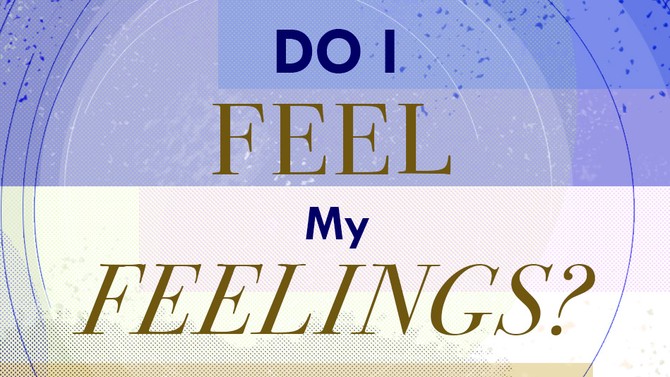
Illustration: OWN Digital
Do I Feel My Feelings?
Maybe you can experience levity enough to laugh, embarrassment enough to blush, irritation enough to bitch. But maybe the sadder, angrier, uglier stuff you drown out or deny. Maybe your life's central trauma, the biggie, the time when you were 17 and a person who was supposed to protect you, whom you loved and still love, hurt you worse than you knew was possible—maybe you lock that up, turn from it. And why not? Those feelings are too big, too loud, unwieldy, undignified. Plus, that was ages ago. Plus, you have a life! And there's no room in it to nurse some old ache. So you tell yourself you're not wounded or enraged—how could you be, everything is okay, don't look over there, nothing is happening over there—and soon all that anger and grief retreat. And opting out is so compelling, a study in clean, anesthetic ease.
But after a while you notice that you sure do watch a lot of TV, and change the subject all the time, and you're always ordering three whiskeys instead of one. You find that even your treasured relationships feel bloodless and rote. You find that you can't bear to be still because then you have to think.
So, though it makes you sweaty with fear, you find yourself a shrewd therapist, and she coldcocks you with this little number: "Nobody gets to block out the bad stuff without also losing the good." And after days of pissy denial, you see that she's right, that not feeling feelings worked too well! You don't have to suffer pain, but you've also lost out on its opposite. You're getting by on a low-fat, Xeroxed, Muzak version of happiness. You see that you've become a liar, saying things like "I'm not hurt," "I'm not mad," "I'm fine." You grasp that these lies make you unknowable, which means no one really knows you, which means you're alone. You realize that when you refuse to feel pain, you wind up feeling it forever; you finance it, setting up an installment plan to buy decades of chronic anguish.
You decide to stop paying. You resolve to feel your feelings, starting with the big ones you've backlogged. (You gather you'll be hanging out with that shrewd therapist a while.) You look a friend in the eye and say an impossible thing like "That hurts my feelings." You marvel when he apologizes, says he's glad you told him, that you always should. You file this away, acclimating to the bracing sensation of telling the truth. You take up a doofy hobby—pure fun, zero nutritional value—to remember what delight feels like. You think about the people you'd take a bullet for, square your shoulders, and tell them you love them, because in all this time you never have.
You fly home and invite the person who hurt you so bad, the person you loved and still love, into your pristine rental car. You don't have a destination in mind, but you want to be driving, holding the wheel, when you say another impossible thing, which is "You nearly broke me in half." And you marvel this time, as well—not because she too apologizes, though that is more than you knew you could hope for. No, you marvel because it doesn't matter what comes out of her mouth, because all that matters is that you have arrived somewhere. What matters is that you are awake and alive, you can see. You see that you still have time, you didn't waste it all. You see that you are strong enough to survive the world and the hurt floating around in it. And you see that ditching an approach that did you no favors—that made you a stranger to yourself, left you only a partial person—feels really good.
—Katie Arnold-Ratliff, O's Articles Editor
But after a while you notice that you sure do watch a lot of TV, and change the subject all the time, and you're always ordering three whiskeys instead of one. You find that even your treasured relationships feel bloodless and rote. You find that you can't bear to be still because then you have to think.
So, though it makes you sweaty with fear, you find yourself a shrewd therapist, and she coldcocks you with this little number: "Nobody gets to block out the bad stuff without also losing the good." And after days of pissy denial, you see that she's right, that not feeling feelings worked too well! You don't have to suffer pain, but you've also lost out on its opposite. You're getting by on a low-fat, Xeroxed, Muzak version of happiness. You see that you've become a liar, saying things like "I'm not hurt," "I'm not mad," "I'm fine." You grasp that these lies make you unknowable, which means no one really knows you, which means you're alone. You realize that when you refuse to feel pain, you wind up feeling it forever; you finance it, setting up an installment plan to buy decades of chronic anguish.
You decide to stop paying. You resolve to feel your feelings, starting with the big ones you've backlogged. (You gather you'll be hanging out with that shrewd therapist a while.) You look a friend in the eye and say an impossible thing like "That hurts my feelings." You marvel when he apologizes, says he's glad you told him, that you always should. You file this away, acclimating to the bracing sensation of telling the truth. You take up a doofy hobby—pure fun, zero nutritional value—to remember what delight feels like. You think about the people you'd take a bullet for, square your shoulders, and tell them you love them, because in all this time you never have.
You fly home and invite the person who hurt you so bad, the person you loved and still love, into your pristine rental car. You don't have a destination in mind, but you want to be driving, holding the wheel, when you say another impossible thing, which is "You nearly broke me in half." And you marvel this time, as well—not because she too apologizes, though that is more than you knew you could hope for. No, you marvel because it doesn't matter what comes out of her mouth, because all that matters is that you have arrived somewhere. What matters is that you are awake and alive, you can see. You see that you still have time, you didn't waste it all. You see that you are strong enough to survive the world and the hurt floating around in it. And you see that ditching an approach that did you no favors—that made you a stranger to yourself, left you only a partial person—feels really good.
—Katie Arnold-Ratliff, O's Articles Editor
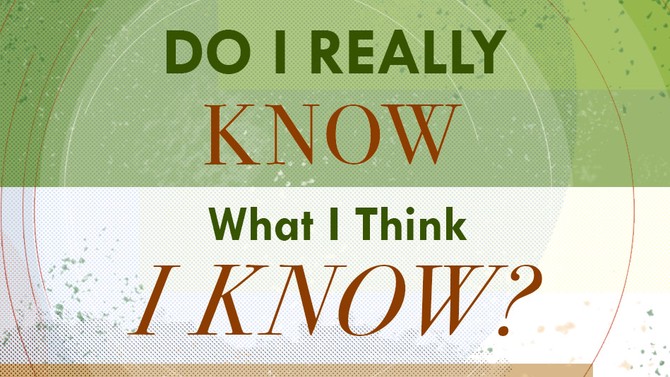
Illustration: OWN Digital
Do I Really Know What I Think I Know?
If I don't have insurance and borrow a friend's car, am I covered by her policy?
If you're driving a friend's car and you smash it up, your friend's collision insurance will likely pay out for the damages to the vehicle. (That's true even if you have your own policy, though your own insurance would probably have to pay for any personal or property liability, medical expenses and possibly other costs beyond the limits of your friend's policy.)
How many kegels does one actually need to do to make a difference?
Kegel exercises—the tightening and releasing of the pelvic floor muscles—strengthen the muscles that support the uterus, bladder, intestines and rectum. Gynecologist Arnold Kegel, MD, originally developed the exercise in 1948 to help women restore vaginal muscle function after childbirth; it was later found that toning those muscles also boosts arousal during sex. To find the muscles, if you haven't already, pretend to stop yourself from urinating. You should feel a contraction from your anus to your vaginal region. Try holding the muscles there for five seconds. Release and rest for five seconds, then repeat. Practice until you can hold and release for ten seconds. Experts recommend ten repetitions of ten-second contractions, three times a day.
What is a second cousin, and how does that differ from a first cousin once removed?
Your second cousin is the child of your parent's first cousin, while your first cousin once removed is the child of your first cousin or the first cousin of your parent. So, let's say Joe and Jane are first cousins: Joe's children and Jane's children are second cousins to each other. Jane is a first cousin once removed to Joe's kids (and Joe to her kids), and is also first cousin once removed to her dad's or mom's first cousin.
Is it butt naked or buck naked?
While many etymologists agree that the standard expression is buck naked—it's appeared in works by William Faulkner and Margaret Mitchell—its origin is a matter of speculation. Some believe it may have come about as a more polite variation on butt naked. Others believe that buck is the older term and refers to buckskin; bare buttocks are, at least proverbially, as smooth as the skin of a deer. If you prefer to avoid etymological controversy, just go with stark-naked.
—Naomi Barr, O's chief of research
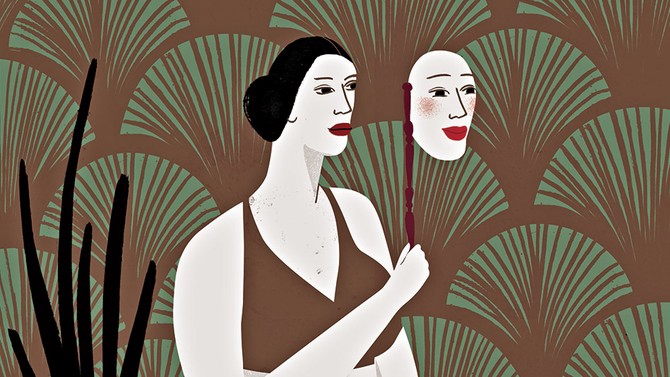
Illustration: Sari Cohen
Do I See Myself as Others See Me?
When I was a teenager, I kept an unframed chunk of mirror tilted up against the wall on my desk, and when I sat there with my books I would look into the mirror, pulling faces, trying different angles, standing up to peer over my shoulder at my butt in my jeans. "Don't be so vain," my mother would scold if she caught me. "She doesn't understand," I would think, flipping the mirror facedown. I knew what I was looking for in that mirror—a glimpse of something valuable that others might see in me, a clue that I was worth loving. Mostly, I'm sad to say, I thought: "Not thin or pretty enough."
In the three decades since, I've gained confidence, but that hasn't stopped me from striving for perfection in hopes that my imagined audience will judge me good enough, worthy. How do others see us? We can never really know, but I'm certain the view from the outside is far brighter than the one from inside our own brains. We are all our own worst critics.
I am a mother and wife, a teacher and writer, a colleague and friend. In these roles, I am alternately smart or dull, funny or tedious, patient like a saint or on my own last nerve. The facts of my life are that I'm (fairly) successfully managing to do it all, and yet there are still those days when I feel as if I've done none of it well enough. I want to be seen as a woman who can teach an inspiring class, submit a prize-winning essay, hit the gym and still have time to bake vegan cupcakes for the class party—but sometimes my lecture bombs, the words won't come, I skip the workout to make the cupcakes and the frosting comes out thin.
However small these failings may seem, they do make me feel like a failure. But I'm guessing no one else would see me that way. Writing is all about revision, the gym will still be there tomorrow, and let's face it, kids prefer gooey cupcakes. We think others are judging our gaffes ("Did I really say that?" and so on), too-snug jeans, the pimple on our nose, but of course those people are likely too busy considering their own imagined deficiencies even to notice ours. And if they do? They don't care. Seriously. What would the world be like if we all gave each other a break, starting with ourselves?
Here's what worries me: Our 6-year-old son, Henry, is showing early signs of my perfectionism. He wants to color in the lines, build the best LEGO robot and spell all the words right on quizzes. "I'm not good enough," he says, and my heart cracks. Why doesn't he see the brilliant, loving, funny boy the rest of us see?
As a mother, I am responsible for more than just my own self-image. To what extent am I the mirror into which Henry peers? And how do I want to use the power of this reflection?
Long after my treacherous teen years, I learned to stop turning first to the mirror for evidence of self-worth, but while my methods have shifted, Henry has reminded me that my new measures are no less ruthless: Did I sound like a fool? Could I have been more generous? Was I patient with my kids today? For Henry, and for myself, I am practicing being gentler with my answers.
"It's hard to be human," I said to Henry this morning at breakfast, still smiling when he got a smear of butter on the book he maybe shouldn't have been reading at the table. He nodded. If I want him to turn a more forgiving lens on himself, I need to model self-kindness. Together, I want us to make mistakes—cut a crooked line, spill the juice, fall down from tree pose—and laugh. I want us to practice imperfection, not sweating the small stuff on the much bigger journey of living a full, rich, compassionate life.
—Jill Christman, author of the memoir Darkroom
In the three decades since, I've gained confidence, but that hasn't stopped me from striving for perfection in hopes that my imagined audience will judge me good enough, worthy. How do others see us? We can never really know, but I'm certain the view from the outside is far brighter than the one from inside our own brains. We are all our own worst critics.
I am a mother and wife, a teacher and writer, a colleague and friend. In these roles, I am alternately smart or dull, funny or tedious, patient like a saint or on my own last nerve. The facts of my life are that I'm (fairly) successfully managing to do it all, and yet there are still those days when I feel as if I've done none of it well enough. I want to be seen as a woman who can teach an inspiring class, submit a prize-winning essay, hit the gym and still have time to bake vegan cupcakes for the class party—but sometimes my lecture bombs, the words won't come, I skip the workout to make the cupcakes and the frosting comes out thin.
However small these failings may seem, they do make me feel like a failure. But I'm guessing no one else would see me that way. Writing is all about revision, the gym will still be there tomorrow, and let's face it, kids prefer gooey cupcakes. We think others are judging our gaffes ("Did I really say that?" and so on), too-snug jeans, the pimple on our nose, but of course those people are likely too busy considering their own imagined deficiencies even to notice ours. And if they do? They don't care. Seriously. What would the world be like if we all gave each other a break, starting with ourselves?
Here's what worries me: Our 6-year-old son, Henry, is showing early signs of my perfectionism. He wants to color in the lines, build the best LEGO robot and spell all the words right on quizzes. "I'm not good enough," he says, and my heart cracks. Why doesn't he see the brilliant, loving, funny boy the rest of us see?
As a mother, I am responsible for more than just my own self-image. To what extent am I the mirror into which Henry peers? And how do I want to use the power of this reflection?
Long after my treacherous teen years, I learned to stop turning first to the mirror for evidence of self-worth, but while my methods have shifted, Henry has reminded me that my new measures are no less ruthless: Did I sound like a fool? Could I have been more generous? Was I patient with my kids today? For Henry, and for myself, I am practicing being gentler with my answers.
"It's hard to be human," I said to Henry this morning at breakfast, still smiling when he got a smear of butter on the book he maybe shouldn't have been reading at the table. He nodded. If I want him to turn a more forgiving lens on himself, I need to model self-kindness. Together, I want us to make mistakes—cut a crooked line, spill the juice, fall down from tree pose—and laugh. I want us to practice imperfection, not sweating the small stuff on the much bigger journey of living a full, rich, compassionate life.
—Jill Christman, author of the memoir Darkroom
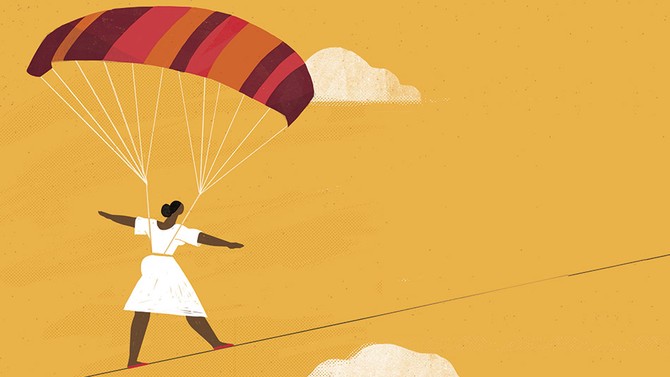
Illustration: Sari Cohen
Am I Ready for Whatever Comes?
My father, a hardworking dentist who loved to read and play pinochle, died of a heart attack when I was 5 and my mother was in her late 30s. My mother had a strategy for facing the world: She didn't believe in luck. She believed in sturdiness. Though we spent years at odds, even I (her most critical witness) had to admire this. Strength was her plan B.
While this approach failed to make certain human concessions—she disapproved of weeping at funerals, sang a soap opera theme song if she thought I was overdramatizing—I have come to regard it as one of the gifts of my upbringing. I don't mean (who would believe me if I did?) that I've always behaved well in the face of disaster. But I had a model of hardiness to copy, standards to pull me through. A plan B, whatever its parameters, assumes not only that catastrophe will strike, but also that a person can be equal to it.
As a kid, I often imagined possible tests. "If an enemy army took over, would you deny your beliefs? Would you betray someone if it got really bad?" These rehearsals showed a desire to be ready for the worst, a wish to be fearless.
Some of the happier memories of my childhood are the times when the lights went out. Hurricanes can hit New Jersey in the fall, and we were always ready. Flashlights, candles, food, blankets. During one storm, my older brother put a birthday candle in the candlestick from the game Clue, which I thought was incredibly witty. Lack of panic made us festive.
I live in Manhattan now, and when Hurricane Sandy hit in 2012, I was stocked with bottled water, a filled tub and enough dog food for weeks. I try to remember that my carry-on, however minimal, had better contain a nightgown, a toothbrush and underwear, just in case the airline loses my luggage. Who can say it won't?
—Joan Silber, author of, most recently, the short-story collection Fools
While this approach failed to make certain human concessions—she disapproved of weeping at funerals, sang a soap opera theme song if she thought I was overdramatizing—I have come to regard it as one of the gifts of my upbringing. I don't mean (who would believe me if I did?) that I've always behaved well in the face of disaster. But I had a model of hardiness to copy, standards to pull me through. A plan B, whatever its parameters, assumes not only that catastrophe will strike, but also that a person can be equal to it.
As a kid, I often imagined possible tests. "If an enemy army took over, would you deny your beliefs? Would you betray someone if it got really bad?" These rehearsals showed a desire to be ready for the worst, a wish to be fearless.
Some of the happier memories of my childhood are the times when the lights went out. Hurricanes can hit New Jersey in the fall, and we were always ready. Flashlights, candles, food, blankets. During one storm, my older brother put a birthday candle in the candlestick from the game Clue, which I thought was incredibly witty. Lack of panic made us festive.
I live in Manhattan now, and when Hurricane Sandy hit in 2012, I was stocked with bottled water, a filled tub and enough dog food for weeks. I try to remember that my carry-on, however minimal, had better contain a nightgown, a toothbrush and underwear, just in case the airline loses my luggage. Who can say it won't?
—Joan Silber, author of, most recently, the short-story collection Fools

Illustration: OWN Digital
What Is My Blind Spot?
I live in Berkeley, where people like bumper stickers. One that stays with me reads "Don't believe everything you think."
Each of us has a blind spot, some part of our psyche we can't quite acknowledge—biases we don't know we have, unexamined beliefs that govern our attitudes and distort our view.
In trying to locate mine—however much I'd like to believe I don't have one—I decided to start by examining my shortcomings, the problems I've had again and again. I came up with a long list. I've been dishonest with myself and others, jealous, lazy, clueless and spiteful. I've been eager to impress, intolerant, pretentious and impatient. Blind spots, I find, are like developing Polaroids: They start out indistinct, but become clearer over time. Though I've only caught glimpses of my blind spot in the past, in hindsight I recognize it now as the root of many of my regrets and mistakes. My blind spot is an inability to see myself as a person who sometimes needs help.
I come from a family that specializes in doing things the hard way—working-class people who never take a handout. As the first in my family to go to college, I arrived on campus with a chip on my shoulder. I didn't know how to say, even to myself, that I felt out of place, worried about money, guilty about crossing class lines. Though I was in over my head, seeking help would have exposed me as weak.
I can still see myself as a sullen 19-year-old, called into a college counselor's office to explain why, as a sophomore with good grades, I was withdrawing from school. "I just want to leave," I said.
The woman pressed me, but the more she tried to help, the more I clammed up. Before she finally let me leave, she told me she would grant me a leave of absence and let me return to school during the next two years without reapplying.
After a year I was desperate to go back. So desperate, in fact, that I finally asked for help. I threw myself on the mercy of an admissions officer. I told him I wanted to go to school but had no money, no help from my parents. I walked out of his office with a grant, a work-study job and a waiver of my fees. I earned a degree, and my life was changed.
I should have learned from this, but that's how blind spots work. You can't see them; it's right there in the name. The pattern repeated itself again and again, personally and professionally. Offers of help triggered a suspicion of ulterior motives, a fear of being controlled. I squandered a lot of kindness and wisdom.
We see friends make the same mistakes over and over and wonder how they can be so oblivious. But is there a similar pattern to the problems that beset you? Criticism you hear repeatedly? Look closer at the problems you keep bumping into and see what they tell you.
Recently, I found myself searching the grocery store for dog chews. From the other end of the aisle a clerk approached, holding up a clipboard that said "Ask Me." I panicked. Every aisle I turned down, there he was, like the villain in a horror movie. When I finally broke down and followed the clipboard's instructions, the clerk grinned, as if he'd been waiting for this moment all along.
I'd done it again. Literally fled from someone who was trying to help me. That's the trouble with blind spots: They're stubborn. But maybe that's a good thing—their persistence gives you all kinds of chances to finally see them. And maybe even pay attention.
—Leslie Larson, author of, most recently, the novel Breaking Out Of Bedlam
Each of us has a blind spot, some part of our psyche we can't quite acknowledge—biases we don't know we have, unexamined beliefs that govern our attitudes and distort our view.
In trying to locate mine—however much I'd like to believe I don't have one—I decided to start by examining my shortcomings, the problems I've had again and again. I came up with a long list. I've been dishonest with myself and others, jealous, lazy, clueless and spiteful. I've been eager to impress, intolerant, pretentious and impatient. Blind spots, I find, are like developing Polaroids: They start out indistinct, but become clearer over time. Though I've only caught glimpses of my blind spot in the past, in hindsight I recognize it now as the root of many of my regrets and mistakes. My blind spot is an inability to see myself as a person who sometimes needs help.
I come from a family that specializes in doing things the hard way—working-class people who never take a handout. As the first in my family to go to college, I arrived on campus with a chip on my shoulder. I didn't know how to say, even to myself, that I felt out of place, worried about money, guilty about crossing class lines. Though I was in over my head, seeking help would have exposed me as weak.
I can still see myself as a sullen 19-year-old, called into a college counselor's office to explain why, as a sophomore with good grades, I was withdrawing from school. "I just want to leave," I said.
The woman pressed me, but the more she tried to help, the more I clammed up. Before she finally let me leave, she told me she would grant me a leave of absence and let me return to school during the next two years without reapplying.
After a year I was desperate to go back. So desperate, in fact, that I finally asked for help. I threw myself on the mercy of an admissions officer. I told him I wanted to go to school but had no money, no help from my parents. I walked out of his office with a grant, a work-study job and a waiver of my fees. I earned a degree, and my life was changed.
I should have learned from this, but that's how blind spots work. You can't see them; it's right there in the name. The pattern repeated itself again and again, personally and professionally. Offers of help triggered a suspicion of ulterior motives, a fear of being controlled. I squandered a lot of kindness and wisdom.
We see friends make the same mistakes over and over and wonder how they can be so oblivious. But is there a similar pattern to the problems that beset you? Criticism you hear repeatedly? Look closer at the problems you keep bumping into and see what they tell you.
Recently, I found myself searching the grocery store for dog chews. From the other end of the aisle a clerk approached, holding up a clipboard that said "Ask Me." I panicked. Every aisle I turned down, there he was, like the villain in a horror movie. When I finally broke down and followed the clipboard's instructions, the clerk grinned, as if he'd been waiting for this moment all along.
I'd done it again. Literally fled from someone who was trying to help me. That's the trouble with blind spots: They're stubborn. But maybe that's a good thing—their persistence gives you all kinds of chances to finally see them. And maybe even pay attention.
—Leslie Larson, author of, most recently, the novel Breaking Out Of Bedlam
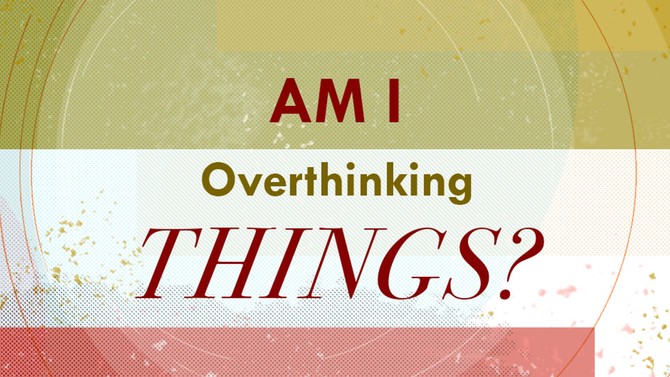
Illustration: OWN Digital
Am I Overthinking Things?
Once, during savasana, or corpse pose, at the end of a yoga class, I was lying on my back with my eyes closed, jiggling one foot, when the teacher came over and whispered, "Whatever you're thinking about, I promise it will be better if you can stop thinking about it for five minutes."
I knew that was true, but then I spent five minutes thinking about why it was true: why ceasing to think might be useful, and why I struggle with it, and whether I really wanted to be more corpselike. I do not have a quiet mind.
I'm a writer, which is a lucky break for me: I'm paid to turn things over and over. The artist I feel most kinship with is the French painter Pierre Bonnard, who revised his work endlessly and once had a friend distract a guard in the Musée du Luxembourg so he could fix a painting after it had been hung.
But self-editing becomes a habit. I lose sleep rerunning conversations in my mind. All the dumb things I said (the inane questions, the indiscretions, the inadvertent slights) could have been avoided if I'd been able to take some time to consider and revise.
I also think about the tiny chance occurrences that determine the course of a life. I tagged along on someone else's blind date, as the guest of a guest of a guest, and met the man I love. I took a beginning fiction class, and a fellow student became, years later, my wonderful editor. I stood in the shade against a building and then walked away, and a ton of bricks fell and buried the spot where I'd been standing. Those accidents of fate make me think that every step we take should be weighed and measured. A different party, a different class, a longer pause on the street might change everything. How do you know which is the right path when there's no moral difference and you can't see the outcome or the other options? How do you not second-guess everything?
I think the yoga teacher is right: Giving your brain a break makes everything easier. The solution seems to be in the physical, in getting out of the mind and into the body, but yoga isn't enough for my fidgeting brain. So I've tried to find activities that don't let you think.
My latest attempt is flying trapeze. In theory, it's the perfect Zen practice because it happens so fast. If you're not in the moment, you'll do everything a moment too late. But I am perfectly capable of stewing and indecision in midair. When doing a trick with a full twist, I have twisted one way and then changed my mind and twisted back the other, which doesn't work—you go tumbling crazily to the net. A coach once shouted from the ground, as I reached for the bar to begin, "I can see you thinking! Stop that!"
Sometimes, magically, I can stop, especially when I've done a trick so often that my body knows what happens next without any meddling from upstairs. I am airborne, weightless, not thinking at all. It has a sluicing effect on the mental clutter. It's not only exhilarating, it's a profound relief.
Back on the ground, in my deliberating brain, everything is a little quieter. Thinking is necessary and useful again, but there's a clearer space for it. Once in a while you need to put thoughts on hold, by whatever means possible, and just leap.
—Maile Meloy, author of Both Ways Is The Only Way I Want It
I knew that was true, but then I spent five minutes thinking about why it was true: why ceasing to think might be useful, and why I struggle with it, and whether I really wanted to be more corpselike. I do not have a quiet mind.
I'm a writer, which is a lucky break for me: I'm paid to turn things over and over. The artist I feel most kinship with is the French painter Pierre Bonnard, who revised his work endlessly and once had a friend distract a guard in the Musée du Luxembourg so he could fix a painting after it had been hung.
But self-editing becomes a habit. I lose sleep rerunning conversations in my mind. All the dumb things I said (the inane questions, the indiscretions, the inadvertent slights) could have been avoided if I'd been able to take some time to consider and revise.
I also think about the tiny chance occurrences that determine the course of a life. I tagged along on someone else's blind date, as the guest of a guest of a guest, and met the man I love. I took a beginning fiction class, and a fellow student became, years later, my wonderful editor. I stood in the shade against a building and then walked away, and a ton of bricks fell and buried the spot where I'd been standing. Those accidents of fate make me think that every step we take should be weighed and measured. A different party, a different class, a longer pause on the street might change everything. How do you know which is the right path when there's no moral difference and you can't see the outcome or the other options? How do you not second-guess everything?
I think the yoga teacher is right: Giving your brain a break makes everything easier. The solution seems to be in the physical, in getting out of the mind and into the body, but yoga isn't enough for my fidgeting brain. So I've tried to find activities that don't let you think.
My latest attempt is flying trapeze. In theory, it's the perfect Zen practice because it happens so fast. If you're not in the moment, you'll do everything a moment too late. But I am perfectly capable of stewing and indecision in midair. When doing a trick with a full twist, I have twisted one way and then changed my mind and twisted back the other, which doesn't work—you go tumbling crazily to the net. A coach once shouted from the ground, as I reached for the bar to begin, "I can see you thinking! Stop that!"
Sometimes, magically, I can stop, especially when I've done a trick so often that my body knows what happens next without any meddling from upstairs. I am airborne, weightless, not thinking at all. It has a sluicing effect on the mental clutter. It's not only exhilarating, it's a profound relief.
Back on the ground, in my deliberating brain, everything is a little quieter. Thinking is necessary and useful again, but there's a clearer space for it. Once in a while you need to put thoughts on hold, by whatever means possible, and just leap.
—Maile Meloy, author of Both Ways Is The Only Way I Want It
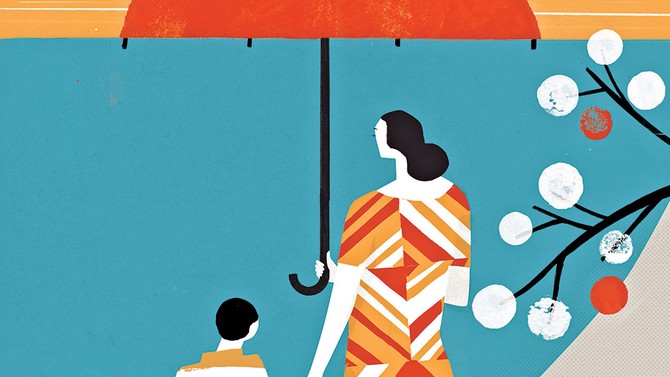
Illustration: Sari Cohen
Am I Ignoring the Obvious?
Sometimes the way I get through my day is by reminding myself that it will end. That period when I couldn't sell my novel? It came to an end. Those months of bewilderment with a colicky baby? The baby, now 10, stopped crying a long time ago. Things change. Nothing lasts forever. The sun rises, the sun sets. It's an inevitable, often lovely cycle.
My husband and I have a 4-year-old whom we adopted from Ethiopia when he was 10 months. He's happy, full of energy, curious, loving. He's also aggressive, impulsive, hyperactive. He's been kicked out of three preschools in a year. The previous one endured him for seven days. His last one just gave him the heave-ho after two weeks. Attention deficit hyperactivity disorder, oppositional defiant disorder, attachment disorder, sensory integration disorder, autism, Asperger's. It could be any of the above, or none of them—a mere delay, an "unreadiness" for school, teachers who turned their backs too soon. We don't know.
At first my husband and I corrected, rewarded, took away, enforced, raised our voices, asked him why? After the second school we went to play therapy, to parenting classes. We took advice from friends, family, strangers.
The treasure we found in this pile was so obvious, but it took us far too long to see it. It was the power of praise—for using a nice voice, for trying to solve a problem, for being calm and kind. We've changed the way we speak to our son. We say things like "I like how sweet your voice sounds," and "I love playing with you." Sometimes it sounds as though we've been replaced by Mister Rogers; sometimes we have to go outside for a sarcasm break. But in the midst of this heartache, of seeing our child rejected again and again, praise and kindness and love are the only things we've got.
Of course, it's hard to praise him when you get a phone call saying you have to pick up your child because he cried, fought, wouldn't stop saying "stupid." Months ago I went to get him from school, and after I put him in the car, I couldn't stop crying. I hid it as best I could, trying to think of what to do. Praise? I couldn't praise just then. I thought back to that moment when we saw just how simple the answer was, and I thought: What's logical? What's obvious? What's at my fingertips? I live in Hawaii. The ocean. I didn't care that the beach would feel like a reward. I decided not to take that away from either of us. I drove there, silent. We got out, silent. I took off his shirt and stripped down to my bathing suit. I walked him into the ocean, and then I went underwater and cried. I broke the surface and looked at my son, happily splashing in the surf, a confident, strong swimmer.
What was obvious is that we had the mountain range behind us and the ocean before us. What's obvious is that we will change. What's obvious is that the sun will set and rise, and that everything can be attempted again.
—Kaui Hart Hemmings, author of, most recently, the novel The Descendants
My husband and I have a 4-year-old whom we adopted from Ethiopia when he was 10 months. He's happy, full of energy, curious, loving. He's also aggressive, impulsive, hyperactive. He's been kicked out of three preschools in a year. The previous one endured him for seven days. His last one just gave him the heave-ho after two weeks. Attention deficit hyperactivity disorder, oppositional defiant disorder, attachment disorder, sensory integration disorder, autism, Asperger's. It could be any of the above, or none of them—a mere delay, an "unreadiness" for school, teachers who turned their backs too soon. We don't know.
At first my husband and I corrected, rewarded, took away, enforced, raised our voices, asked him why? After the second school we went to play therapy, to parenting classes. We took advice from friends, family, strangers.
The treasure we found in this pile was so obvious, but it took us far too long to see it. It was the power of praise—for using a nice voice, for trying to solve a problem, for being calm and kind. We've changed the way we speak to our son. We say things like "I like how sweet your voice sounds," and "I love playing with you." Sometimes it sounds as though we've been replaced by Mister Rogers; sometimes we have to go outside for a sarcasm break. But in the midst of this heartache, of seeing our child rejected again and again, praise and kindness and love are the only things we've got.
Of course, it's hard to praise him when you get a phone call saying you have to pick up your child because he cried, fought, wouldn't stop saying "stupid." Months ago I went to get him from school, and after I put him in the car, I couldn't stop crying. I hid it as best I could, trying to think of what to do. Praise? I couldn't praise just then. I thought back to that moment when we saw just how simple the answer was, and I thought: What's logical? What's obvious? What's at my fingertips? I live in Hawaii. The ocean. I didn't care that the beach would feel like a reward. I decided not to take that away from either of us. I drove there, silent. We got out, silent. I took off his shirt and stripped down to my bathing suit. I walked him into the ocean, and then I went underwater and cried. I broke the surface and looked at my son, happily splashing in the surf, a confident, strong swimmer.
What was obvious is that we had the mountain range behind us and the ocean before us. What's obvious is that we will change. What's obvious is that the sun will set and rise, and that everything can be attempted again.
—Kaui Hart Hemmings, author of, most recently, the novel The Descendants
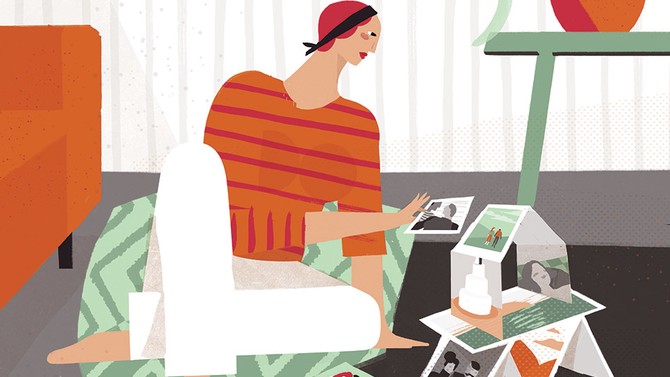
Illustration: Sari Cohen
Have I Made Peace with My Past?
I've told the story of losing my dogs to more friends than I can count. The setup is always the same. First I describe them: King Charles spaniels, a coked-up-seeming white-and-tan named Cooper and a lady black-and-tan, Simone, with the temperament and face of Richard Nixon. I talk about our lives as a pack, the neighbors driven mad by Cooper's psychotic bark, the vets who lined up antidepressants for Simone; I explain that they were half-trained and ill behaved but I loved them so much it was a sickness. Then I introduce the trouble: I had a baby, as a single mother, and my household fell apart. I'd wake up at 5 to an infant wailing, a dog growling at that infant and another dog pooping mutinously in my fireplace. I kept them, insanely, for three more years. Then I moved, and a friend took it upon herself to arrange their adoption. She assured me they would remain together. At this point in the story I pause—and my grief is real—and say, "What could I do?" I describe our last walk together, watching my friend lead them away, and how desperately I wanted to go after them...
This is where the story gets tricky. When I reached the far shore two weeks later, a neighbor texted me saying she thought she'd seen Cooper for sale on TV (in fact, she didn't say "on TV"; she gave the name of a radio station that I mistook for a TV station, but since I got in the habit of saying TV, that's how I remember it). I called my friend and found it was true: The adoption had gone awry and the dogs were in separate homes. I started bawling. All I could see was Cooper's frantic little face on TV (to reiterate: never actually on TV). But then my friend stopped me. "Wait wait wait—wait until you hear what happened!" she said. "After they were split up, they became completely different dogs. It turns out they didn't get along at all! They never figured out who the alpha was." My friend was jubilant, having watched firsthand my years of torment. And instantly, my memory started changing to reflect this new truth. The recollections I'd had of my dogs happily rolling in the grass morphed into visions of standoffs over a stolen bone, of the escape tunnels they'd both tried digging in the backyard. I came to see, in a flowering of new memory, that those dogs had never been happy with me. It had been a shit show from the start.
The question I am building to is this: When we talk about making peace with the past, which past are we talking about? The past changes when our perspective changes, so how (and why?) "make peace" with a mirage? The "past" with my dogs, as I had long imagined it, was a story that merely reflected another story I was already telling, a story about "not quitting" that can easily be traced to my father, who, every time I tried to quit something in life—the oboe, the Dorf twins' lawn Olympics, the student council that would later impeach me—would send me right back in, saying, "You're no quitter." Decades later, I was still gripped by the notion, torturing two dogs and a baby rather than correct my sight.
A lot changes when you give up the idea of your past as "a series of events that happened" and embrace it for what it is, a clutch of mutating stories with no fixed point of reference. If you're not controlling those stories, you can bet they're controlling you, so tell new ones. Tell old ones with fresh and oddball details. Tell stories you don't understand about people you'd like to dismiss. And for the sake of all that is holy, make your stories funny—just as an act of love.
—April Wilder, a writer and teacher whose new blog, TrueRufus.Com, is dedicated to narrative awareness
This is where the story gets tricky. When I reached the far shore two weeks later, a neighbor texted me saying she thought she'd seen Cooper for sale on TV (in fact, she didn't say "on TV"; she gave the name of a radio station that I mistook for a TV station, but since I got in the habit of saying TV, that's how I remember it). I called my friend and found it was true: The adoption had gone awry and the dogs were in separate homes. I started bawling. All I could see was Cooper's frantic little face on TV (to reiterate: never actually on TV). But then my friend stopped me. "Wait wait wait—wait until you hear what happened!" she said. "After they were split up, they became completely different dogs. It turns out they didn't get along at all! They never figured out who the alpha was." My friend was jubilant, having watched firsthand my years of torment. And instantly, my memory started changing to reflect this new truth. The recollections I'd had of my dogs happily rolling in the grass morphed into visions of standoffs over a stolen bone, of the escape tunnels they'd both tried digging in the backyard. I came to see, in a flowering of new memory, that those dogs had never been happy with me. It had been a shit show from the start.
The question I am building to is this: When we talk about making peace with the past, which past are we talking about? The past changes when our perspective changes, so how (and why?) "make peace" with a mirage? The "past" with my dogs, as I had long imagined it, was a story that merely reflected another story I was already telling, a story about "not quitting" that can easily be traced to my father, who, every time I tried to quit something in life—the oboe, the Dorf twins' lawn Olympics, the student council that would later impeach me—would send me right back in, saying, "You're no quitter." Decades later, I was still gripped by the notion, torturing two dogs and a baby rather than correct my sight.
A lot changes when you give up the idea of your past as "a series of events that happened" and embrace it for what it is, a clutch of mutating stories with no fixed point of reference. If you're not controlling those stories, you can bet they're controlling you, so tell new ones. Tell old ones with fresh and oddball details. Tell stories you don't understand about people you'd like to dismiss. And for the sake of all that is holy, make your stories funny—just as an act of love.
—April Wilder, a writer and teacher whose new blog, TrueRufus.Com, is dedicated to narrative awareness

Illustration: OWN Digital
What's In Store For My Future?
It wasn't logical for me to be so bereft when I sent my youngest off to college; he'd been a busy high school student, out more often than not. But, as I explained to the friends willing to listen (who all still had kids at home and responded by rolling their eyes and saying things like "What I wouldn't give for three days alone!"), it's not about the empty house; it's about the way you think about the empty house. With both of my children gone, I saw hours and days and years of nothing stretching into the distance.
I was busy enough—I'm a writer, and was in the midst of a new book—but I needed something else, something new. The previous year I'd helped my son and some of his friends with their college applications, so I called his high school and offered my services to the program that helps first-generation students pursue a degree. I told these kids what I told my own children: Go with an open mind. Try things out. Sure, you're planning to major in history—why not take, say, astronomy? You want to be a doctor—sign up for a poetry class. It moved me to imagine their futures, full of possibility.
But I couldn't see my own future in the same way. The emptiness I felt persisted. I glanced into my kids' bedrooms a few times a week, as if something might have changed. Always, the neatly made bed. Always, the dresser drawers fully closed.
It was time to get radical. Because I work at home and am single, I could go anywhere, so I decided to do exactly that—I would relocate temporarily to New York, where I'd lived at that other time of immense change, the first few years after college. I found a lovely couple from India to rent my house in California, and I sublet a small apartment on the Upper East Side of Manhattan. There, when I wasn't working, I immersed myself in the life of the city, reconnecting with old friends, making new ones. Flying back to San Francisco at the end of my two-month stay, I thought I'd do it again, maybe even the following year.
And that's when it came to me. The future shouldn't be about finding just the right thing to fill the void left by my children. I didn't need a specific solution; I needed a new outlook. For most of my life I'd lived according to one program or another: go to school, find a career, start a family, work hard. Maybe the program for this next part of life was to let go of programs, as much as I could—to embrace the practice of trying new things. Go with an open mind, I'd told the high school students I worked with. Try things out. Good advice at 18, still good at 55. My future can—I'm determined that it will—hold activities and adventures and people I haven't yet dreamed of. We turn a corner, see a row of doors. We can open them all.
—Ann Packer, author of, most recently, the forthcoming novel The Children's Crusade
I was busy enough—I'm a writer, and was in the midst of a new book—but I needed something else, something new. The previous year I'd helped my son and some of his friends with their college applications, so I called his high school and offered my services to the program that helps first-generation students pursue a degree. I told these kids what I told my own children: Go with an open mind. Try things out. Sure, you're planning to major in history—why not take, say, astronomy? You want to be a doctor—sign up for a poetry class. It moved me to imagine their futures, full of possibility.
But I couldn't see my own future in the same way. The emptiness I felt persisted. I glanced into my kids' bedrooms a few times a week, as if something might have changed. Always, the neatly made bed. Always, the dresser drawers fully closed.
It was time to get radical. Because I work at home and am single, I could go anywhere, so I decided to do exactly that—I would relocate temporarily to New York, where I'd lived at that other time of immense change, the first few years after college. I found a lovely couple from India to rent my house in California, and I sublet a small apartment on the Upper East Side of Manhattan. There, when I wasn't working, I immersed myself in the life of the city, reconnecting with old friends, making new ones. Flying back to San Francisco at the end of my two-month stay, I thought I'd do it again, maybe even the following year.
And that's when it came to me. The future shouldn't be about finding just the right thing to fill the void left by my children. I didn't need a specific solution; I needed a new outlook. For most of my life I'd lived according to one program or another: go to school, find a career, start a family, work hard. Maybe the program for this next part of life was to let go of programs, as much as I could—to embrace the practice of trying new things. Go with an open mind, I'd told the high school students I worked with. Try things out. Good advice at 18, still good at 55. My future can—I'm determined that it will—hold activities and adventures and people I haven't yet dreamed of. We turn a corner, see a row of doors. We can open them all.
—Ann Packer, author of, most recently, the forthcoming novel The Children's Crusade
From the February 2015 issue of O, The Oprah Magazine

